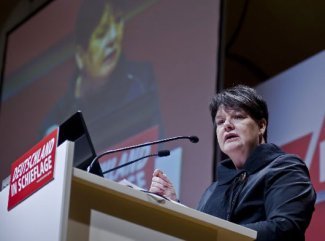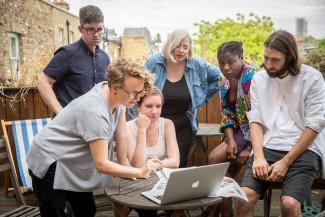After 10 years we are still here, connecting the world of work with wider struggles for democracy, environmental rights, cultural rights, economic justice, sustainable development, and human rights.
It is no small feat for an alternative news media to reach the grand old age of 10. At a time when newsroom budgets are being slashed and audiences are becoming more and more fragmented, we are delighted to be celebrating the first decade of Equal Times.
We launched our online platform in autumn 2012 with a simple but ambitious idea: to help fill the worker-sized gap in the global news media. We wanted to tell the stories of workers and rights defenders from all sectors, from all walks of life and from around the world, putting the spotlight on their victories and their struggles. At a time when the mainstream media was disinterested in trade unions at best and openly hostile at worst, Equal Times helped lead the charge in putting labour rights back on the news agenda.
Ten years later, and we are still here, connecting the world of work with wider struggles for democracy, environmental rights, cultural rights, economic justice, sustainable development, and human rights. Reporting on and analysing what is happening in and around the world of work, we have published thousands of stories, working with close to 1,000 journalists, photographers, opinion writers, academics, and analysts from every corner of the globe.
Since its inception, Equal Times has been generously supported by the labour movement, but that has never stopped us, as professional and trained journalists, from being deeply committed to producing quality journalism.
At a time when fundamental rights are under attack almost everywhere in the world, we recognise that journalists and trade unionist are both canaries in the coalmine.
In the spaces where trade unionists face the greatest danger – in countries such as Myanmar, Zimbabwe, Belarus, and Colombia – journalists too face a growing threat. Our work marries the crucial tasks of supporting quality journalism and putting a spotlight on the independent trade union movement, as both are essential for democracy to thrive.
Almost uniquely in the alternative media space, we publish every story in English, Spanish and French, working mostly with local journalists who are reporting on the ground. This is incredibly important to us. One of the greatest antidotes to the national, linguistic, and cultural parochialism that has sprung up in the backlash against globalisation is being exposed to the ideas, issues, and perspectives of people from outside of your experience in a space that requires deep engagement.
Over the years, we have reported on various categories of workers, from waste pickers to fisherfolk, garment workers to gig workers, from older workers to child labourers. We have turned the spotlight on the travails of rights defenders from Kenya to Hong Kong. We have attempted to analyse various flashpoints of turmoil, from Central African Republic to the Arctic, and Palestine to West Papua. We have exposed the plight of those on the front line of the climate emergency from South Asia to Southern Africa. And while our archives are full of reports of people who face discrimination and injustice, we celebrate those who fight against it, be it those reclaiming decent working conditions, fighting for gender and racial equality, disability justice, LGBTIQA rights, those demanding decent housing, or clean air and water.
As well as covering an evolving selection of topics over the past 10 years, it has been fascinating to observe our ever-changing vocabulary regarding the world of work. Gone are the references to ‘the Troika’; now our lexicon is peppered with terms like ‘just transition’ and ‘coronavirus’. We keep a constant eye on issues such as legislation on due diligence in supply chains, on efforts to unionise in new sectors and spaces, on the growth of illiberalism and the extreme right, and on the constant, multi-faceted fight for gender equity – all against the backdrop of the existential challenge of the climate emergency. It is an ambitious programme to attempt to cover the whole world, and there are many ways in which we fall short. However diligent we might be, with our small newsroom of three – yes, just three editors; Tamara Gausi editing the English section, Marta Checa manning the helm in Spanish, and French language editor Mathilde Dorcadie – we can only do so much to keep abreast of the breakneck speed of world events. But there are still many more topics and parts of the world that we plan to cover, so keep watching this space.
From our offices in Brussels, we are connected to a global network of journalists, photographers, translators, activists, experts and, of course, readers. We are fiercely proud that valuable input from this diverse range of stakeholders enables us to do the work that we do.
We are particularly grateful to our wonderful translation team, who do the invisible, exacting and pivotal work of making our trilingual website possible. But perhaps what we are most proud of is telling stories that our journalists would have struggled to get published elsewhere, often because other media could not find the economic imperative to do so. Stories such as the tale of Iran’s water crisis, the plantation workers in Ecuador trapped in modern slavery and our in-depth reporting on Cambodia’s trade union struggle. We don’t do ‘breaking news’ but, mindful of the position of journalism as the “first rough draft of history” we tend to forgo more time-sensitive stories for deeper analysis of long-term trends.
We have provided media training and mentorship to scores of emerging journalists. Our journalism has won several awards, including: the 2019 ILO Global Media Competition on Labour Migration, which was won by Spanish journalist Carmen Grau for her article on the future of work in an ageing Japan; the 2020 Lorenzo Natali Media Prize, which was awarded to Nigerian journalist Shola Lawal for her searing report on the migrant crisis in the Darién Gap; and the 2021 Michael Elliott Award for Excellence in African Storytelling, granted to Congolese journalist Bernadette Vivuya for her exemplary piece on child miners in North Kivu.
Equal Times would not be here without the financial and infrastructural support of the International Trade Union Confederation (ITUC), particularly the enthusiastic backing of the current general secretary Sharan Burrow, and funding from bodies such as the International Labour Organization and various foundations. There is still plenty more to come; we have only touched the surface of the stories that need to be told. But we need sustainable finances. The work we do, and crucially, the way in which we do it – rigorous, inclusive, adhering to principles of decent work, respect, and solidarity – is more important than ever. The challenges that are facing the world are colossal, and having a media space that provides well-researched and well-written multilingual stories, that are local, international, and transnational – sometimes all at once – is vital to help people make sense of the fast-changing world in which they are living. It is important that the work of Equal Times remains free of ads, free of clickbait and free to access, but quality information is costly, and we passionately hope that we can continue to meet the challenge. But for now, please join us in toasting ten years of news at work. You can subscribe to our newsletter to keep abreast of our latest stories or you can email us at [email protected] to respond to any of the points raised in this article, to suggest a story idea or to simply say ‘hello’.















